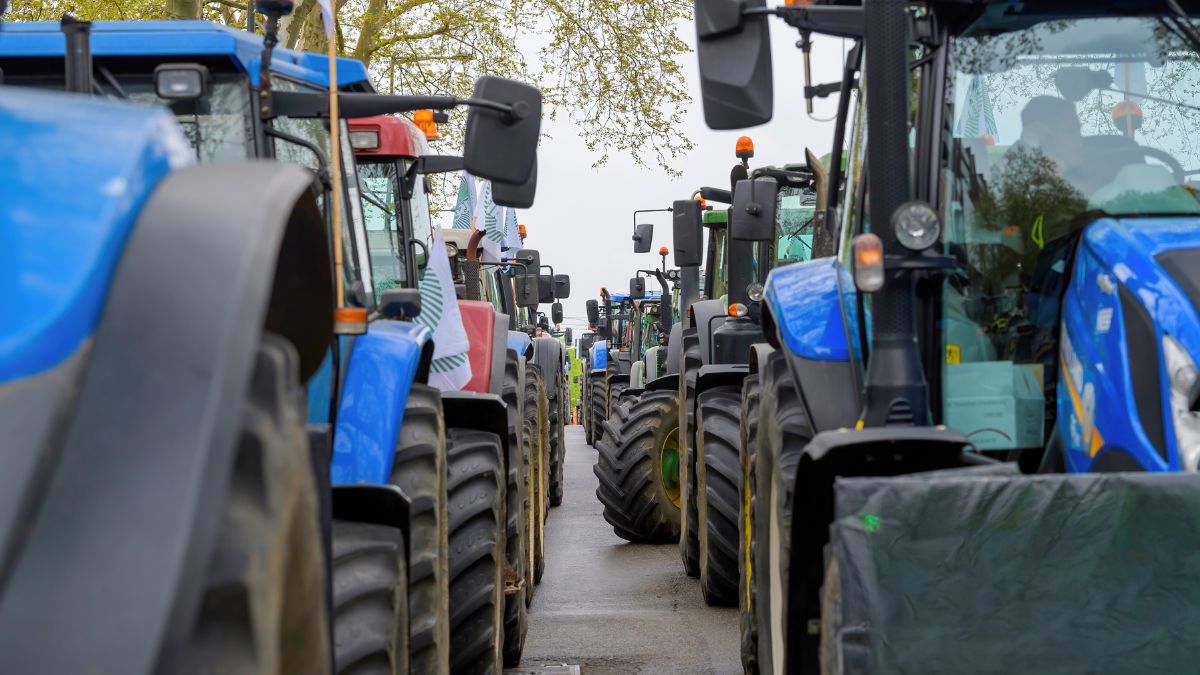Large-scale demonstrations and blockades, though not unprecedented, have been stirring up French news for a few days. Regular reports on the health of the agricultural system have always led to the same findings. What’s suddenly happening? Should we be worried?

The agricultural movement that has been shaking France and Europe for the past few weeks is not without precedent in our history.
The Flour War in the 18th century, triggered by the liberal reforms of Jacques Turgot, is a striking parallel. At that time, Turgot had abused the King’s trust and abolished regulations that protected local grain markets.
Leading to exacerbated social and economic tensions and, inevitably, food riots.
This historical period eerily echoes the current situation. The European Union, through various policies and trade agreements, has gradually opened agricultural markets to wider and often more intense competition. This opening, similar in spirit to Turgot’s liberalization, has had profound consequences for French farmers. It places them in a globalized competitive environment where pressures on prices, environmental standards, and production practices are intensifying. French farmers find themselves unfairly competing with producers from neighboring (and distant!) countries, for whom costly standards do not apply in full or in part.
The current crisis in the French agricultural sector stems from a multitude of challenges that farmers face. These challenges include regulatory constraints deemed excessive, rising production costs, and constant pressure to maintain sustainable production. However, they must remain competitive against unrestrained agricultural powers such as Brazil or Argentina, which are favored by ever-increasing international agreements (the most recent agreement with New Zealand)
Taxation on agricultural fuel and the rejection of the Green Deal have triggered initial movements in the Netherlands, Germany, Poland, Romania, and the United Kingdom. The mobilization started in the Netherlands and then spread to Germany concerning the taxation of agricultural fuel. The mobilization of farmers in France, notably orchestrated by the FNSEA, expresses the exasperation of a whole profession tired of playing a contradictory system’s game and forced to deny its original raison d’être, namely the valorization of our land and its resources.

The current protests, while centered on specific demands such as the easing of environmental standards (which is not necessarily good news!) and a change in the approach of the French Office for Biodiversity, are symptomatic of deeper issues. These issues include the economic viability of small and medium-sized farms, the impact of international trade agreements on local prices, locked access to land ownership, and the necessary adaptation to climate change.
If the farmers’ movement continues, the consequences on food supply could be significant. A reduction in agricultural supply, due to disruptions in production and distribution chains, could lead to a rise in food prices. Such a price spike would have direct repercussions on consumers, increasing the cost of living and potentially exacerbating food insecurity issues.
« If Rungis is blocked, what will be the real consequences? It will surely lead to another price spike and, as in past crises, attract certain forms of economic opportunism »
Matthieu Urban, co-founder of Myfood
Moreover, the disruption of supply chains could have cascading effects on other economic sectors, exacerbating social and economic tensions. Imports might be increased to compensate for local deficits. However, this could impact the trade balance, potentially unsustainable in the long term. Food sovereignty would be further weakened. It’s important to note that today, more than 50% of fruits and vegetables on French tables are imported. The same goes for poultry.
During past crises, shortages have been used by supply chain actors to opportunistically increase their profit margin, which is doubly worrying.
It’s urgent to guard against this!
A few centuries ago, a blockade in Paris would have hardly worried the citizens. They already produced their own food on their land. Given this situation and the interdependence of supply circuits, developing greater food autonomy becomes an urgent necessity for households.
Food self-sufficiency at home is not just a response to current crises. It’s also a step towards a more sustainable and resilient future. By growing their own food, individuals can help reduce their carbon footprint, without being subject to the fluctuations of food markets. This movement towards food autonomy is not just a precautionary measure in the face of the current agricultural crisis, but a paradigm shift in our relationship with food. It’s an opportunity to rebuild a fairer, more resilient food system that is more aligned with contemporary environmental and social values.
Citizens are waking up, and that’s a good thing!
Equip yourself with a greenhouse and a chicken coop, plant trees, make preserves, etc. If it’s not this crisis that forces you to do it, it will most likely be the next one. Moreover, for all other products, here’s a way to support our farmers: buy directly locally and avoid purchasing imported products in stores when they can come from our country!
For more info read: Food Autonomy with a Greenhouse: Possible or Not?
